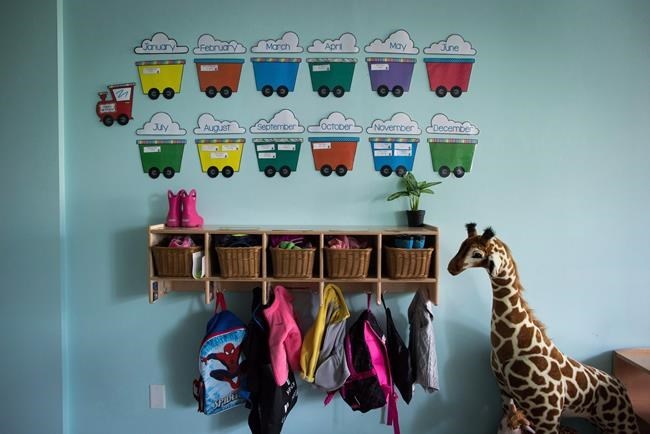IQALUIT, Nunavut — Families in Nunavut are now paying an average of $10 a day for child care, the first jurisdiction to achieve the goal under a Canada-wide plan.Â
The federal government has signed agreements with every province and territory, aiming to reduce child-care fees by an average of 50 per cent by the end of 2022 and to $10 a day by 2026.
Here is how the program is rolling out across the country.Â
Nunavut signed a $66-million agreement in January with plans to reach $10 a day by March 2024 and create 238 new spaces by the end of March 2026.
But the territory is ahead of schedule, implementing $10-a-day as of Thursday. It has also created 30 new spaces. Â
Northwest Territories signed a $51-million agreement in December 2021 with plans to create 300 new child-care spaces and reach $10 a day by March 2026. The territory said fees have already decreased by an average of 50 per cent with families saving up to $530 a month per child.
It has also created 67 new spaces during the last fiscal year.
Yukon started its own universal child care program in April 2021 and reached the $10-a-day average before signing a nearly $42-million agreement in July 2021.
The territory aimed to create 110 new spaces within five years and said it has created 236 spaces since April 2021.Â
British Columbia was the first to sign on, inking a $3.2-billion deal in July 2021 with plans to create 30,000 new child-care spaces within five years and 40,000 within seven years.Â
B.C. started a $10-a-day program at select facilities in 2018 and plans to double those spaces to 12,500 this month. As of Nov. 1, there were more than 8,200. Â
The province said starting Thursday, child-care fees will be 50 per cent less on average compared to 2019 at participating facilities due to expansion of the $10-a-day program and a fee-reduction initiative.Â
Alberta signed a nearly $3.8-billion deal inNovember 2021 with plans to create 42,500 spaces.Â
The province said as of September, it has created 9,500 spaces and, since January, child-care fees have dropped an average of 50 per cent.Â
Saskatchewan signed a nearly $1.1-billion deal with plans to create 28,000 new spaces.Â
As of Sept. 1, fees have been reduced an average of 70 per cent compared to March 2021 levels.
The province has created 3,402 new spaces, plus 1,166 child-care spaces in family and group family homes.
Manitoba signed a more than $1.2-billion deal in August 2021 with plans to create 23,000 new spaces by 2026 and 1,700 extended-hour spaces for evenings and weekends.Â
It aims to reach $10 a day by 2023.Â
Ontario was the last to sign on in March. It is to receive $10.2 billion over five years, plus $2.9 billion in 2026-27 with plans to create 86,000 new spaces.Â
The province said 33,000 new spaces have been created so far.
Quebec signed an agreement in August 2021 with the federal government committing to transfer nearly $6 billion over five years.
In 2021, parents with a subsidized, reduced contribution space paid $8.50 a day for childcare.Â
New Brunswick signed a $491-million deal in December 2021 to create 3,400 new spaces by the end of March 2026, including 500 by March 2023.Â
The province says fees were reduced by 50 per cent in June, and 401 spaces have been created since April 1.Â
Nova Scotia signed a $605-million agreement with plans to create 4,000 new spaces within two years and 9,500 by 2026.Â
By the end of this month, it said fees will be 50 per cent lower on average compared to 2019.Â
Prince Edward Island signed a $121.3-million deal with plans to create 452 spaces within two years and reach $10 a day by 2024. In January 2022, fees were reduced from $27 to $34 per day to an average of $25, then further dropped to $20 a day in October.Â
Newfoundland and Labrador signed a $347-million agreement to reduce fees from $25 a day in January 2021, to $15 a day in 2022, then $10 a day in 2023. It aims to create 5,895 spaces within five years.Â
This report by The Canadian Press was first published Dec. 1, 2022.
— By Emily Blake in Yellowknife
This story was produced with the financial assistance of the Meta and Canadian Press News Fellowship.
The Canadian Press



